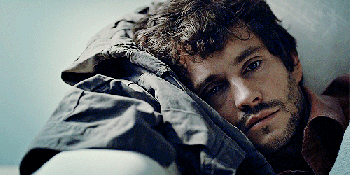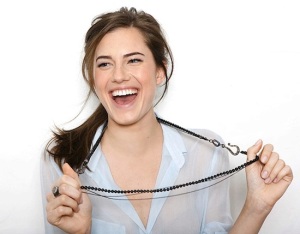Hannibal at its core is a visual feast. With a color pallet like that of a depressed Scandanavian lumberjack with a design degree, the series exercises your plasma and liquid-crystals just as it does your capacity for gore and icky stuff. The season finale this past week begins with Will finding a severed ear in his sink beneath his morning vomit. After weeks of dealing with feverish hallucinations and other treats of untreated encephalitis, it’s unclear really if this is even a strange start to the day. Will handles it, as he’s handled any bump in the road to this point, with a phone call to his pal, confidante, and therapist Dr. Lecter. It’s a curious testimony to how Will perceives his relationships with the other characters of the series. Surely, it makes sense to trust your therapist, and if that therapist so happens to be your friend, so then is the trust doubled—tripled if you share some murderous secret, as is the case with Will, Hannibal (and Abigail).
So blatantly an unhealthy relationship and violation of professional boundaries, the comfort Will draws from Hannibal represents possibly Will’s infatuation with the surface of it all, the way things look. He seems to actively accept his role as the unstable intellectual to the detriment of his physical well-being and the safety of those around him because that’s how the offer Jack places on the table and the image of him that’s attractive to everyone from Jack to Alana Bloom. If Will’s brain was simply inflamed and his methodologies were plainly crazy, Hannibal might as well start serving french fries and holding sessions on a futon in an office building. It’s serendipitous for Will to find someone—an intellectual like himself, meticulously concerned with appearance and artifice—to reinforce the image of Will Graham, the dynamic of series itself.
This is Hannibal. A beautifully designed, smart procession of images. If it were a murder mystery, the logic may fall apart somewhere before Abigail Hobbs is merely given incredulous jeers and snarky looks by the FBI for her involvement in her father’s murder spree and her own body count. If it were a police procedural, Jack Crawford would probably need a better reason to keep an notoriously unstable professor out in the field, armed and fugue-ing all over the place, than his so-called success rate in subduing the show’s rogue gallery of cooky serial killers, which in 13 episodes amounts to more of a fortunate string of outliving them. If Hannibal were any less beautiful, it would become too unabashedly clear that things are not as they may seem. There are no gargantuan moose (“meese” if you’re nasty) haunting Will. Gastronomical proficiency doesn’t equate to quality meat. And intelligence does’t mean psychopathy, no matter how much we’re told psychopathy means intelligence.
Will put his faith in the visage of a thoughtful psychoanalyst with a stylistic flare and a perpetual extra plate, and inadvertently, his fate in the hands of a psychopath. For some reason, with all his intellect, it occurs to Will that Jack may be the copy cat killer their team has been pursuing, before putting the puzzle pieces together and finding an unbelievably stunning portrait of Dr. Hannibal Lecter. Behind bars, wearing a dull orange jumpsuit, Will Graham has finally seen past his elaborately grotesque hallucinations and what he finds is plainly ugly—a set up, betrayal, lost friends, disappointment. The framework remains ornate but the picture, after a gradual, satisfying buildup, has revealed itself to be simply sublime, leaving us all wondering: how will next season look?





